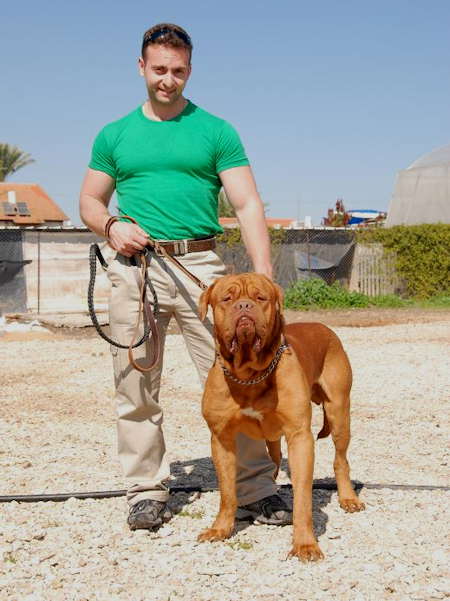It is imperative that a Dogue de Bordeaux puppy receives lots of stimulus. A Dogue should be exposed to as many noises, children, environments and animals as possible during their developing stage. These exposures should be made non confrontational and friendly, ultimately reinforcing good experiences for the puppy or dog. This will help ensure a well rounded adult dog that is able to recognize normal behaviors in the world in which it lives. Not being diligent in the socialization of a Dogue could result in a Dogue being fearful and suspicious of people and it's environment. This ultimately could also lead to defensive biting from a Dogue. Training:
The Dogue de Bordeaux is not a push button dog. Some breeds have a huge desire to please their owners and train easily, not the Dogue. They have a typical Mastiff temperament in that they are very stubborn. A Dogue will have a tendency to do things on their time not yours, requiring a firm and patient trainer. Consistency is the key when dealing with an independent and strong willed temperament like that of the Dogue de Bordeaux. Training sessions should be kept relatively short in order for the dog not to become bored and even more likely the next time to avoid listening. Obedience classes are a great way to socialize your Dogue and learn from others how to motivate the stubborn Dogue during training.
Dogue de Bordeaux - A very old breed, these dogs were used for boar and bear hunting and then for driving cattle. It was not until this breed appeared in an American film in 1989 that it has attained any recognition outside of
The word "dogue" first appeared at the end of the 14th century. In the middle of the 19th century these ancient dogues were hardly renowned outside the region of
Description: The Dogue de Bordeaux is a very powerful dog, with a very muscular body that retains a harmonious general outline. Stocky, athletic, imposing, they have a very dissuasive aspect. An excellent family pet, the Dogue de Bordeaux guards what is theirs, even their owner. They will bond strongly to their family; they feel separation is a form of punishment. Dogue de Bordeaux are stubborn, and arrogant, yet once they learn a command or task, they rarely forget it. Other Name: French Mastiff
Height: Male: 23.5 - 27.5 in. (60 - 68 cm), Female: 22 3/4 - 26 in. (58 - 66 cm).
Weight: Male: at least 110 lbs. (50 kg); Female: least 99 lbs (45 kg).
Colours: Self-colored, in all shades of fawn, from Mahogany to Isabella (lightest fawn). A good pigmentation is required. Limited white patches are permissible on the chest and extremities of the limbs. They are available in three mask colors. 1. No mask or red mask; 2. Brown mask; 3. Black mask.
Coat: Skin, thick and sufficiently loose fitting. Hair, Fine, short and soft to the touch.
Temperament: Dogue de Bordeaux's are calm, balanced and affectionate.
With Children:
With Pets: Usually gets along with everyone. Dogue de
Special Skills: Lover of the family and watch dog.
Watch-dog: Medium
Guard-dog: High
Care and Exercise: Easy care, moderate exercise. The Dogue de Bordeaux loves nothing better than to go for a walk or swim.
Training:
Learning Rate: Don not let the face fool you, they are highly intelligent and learn quickly although they can be quite stubborn. Once they learn a command they rarely forget it.
Activity: Medium
Living Environment: Dogue de
Life Span: 8 - 10 years

